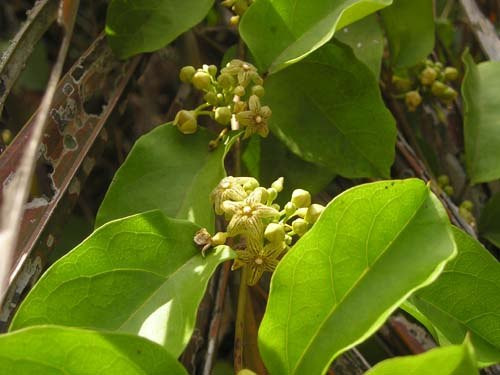Treating premenopausal syndrome according to Oriental medicine
The decline of estrogen during perimenopause leads to many symptoms. Depending on each person's constitution, there are different remedies and treatments.
Perimenopause usually begins at the age of 41-45, sometimes up to 50, the short period can be from 5-7 months, the long period can be 1 to 2 years or longer (some cases last up to 10 years).
During this period, the ovaries begin to decline in function and gradually lead to the complete cessation of their ability to work. As a result, the female hormone estrogen will suddenly decrease. Before that, some hormones secreted by the brain to stimulate ovarian activity also fluctuate. This fluctuation causes some symptoms of premenopause, the most prominent of which is "hot flashes".

Fo-ti is found in many forms of medicine.
Common symptoms are headache, dizziness, insomnia, sweating, red face, feeling hot and restless, nervous, forgetful, feeling numb in the hands and feet or like ants crawling on the skin, irregular menstruation... Due to the decrease in ovarian hormones and the number of ovulations gradually decreasing until stopping, the vaginal glands also reduce secretions, causing vaginal dryness, causing pain during intercourse, which can lead to vaginitis. At the same time, due to lack of estrogen, bone loss increases, leading to osteoporosis, easy fractures, along with symptoms such as fatigue, pain in the hands and feet, and spinal pain.
The severity of the above symptoms often depends on the psychological and mental state of the woman. This disorder makes women irritable, hot-tempered, and has difficulty concentrating at work. People who do intellectual work often suffer more than manual workers.
Menstrual cycle disorders such as irregular, shortened or prolonged, menorrhagia, metrorrhagia... However, fertility still exists until ovulation stops.
According to Oriental medicine, when a woman reaches the age of 42-49, the function of all internal organs is weakened, especially the kidneys. Kidney failure, along with blood and energy deficiency, causes an imbalance between the two elements of yin and yang in the body, affecting the normal functioning of other internal organs, causing premenopausal syndrome. In addition, other factors such as mental, physical, nutritional, reproductive, living conditions, work, and economic conditions of women also affect the condition.
Therefore, treatment needs to combine medication with many other methods such as maintaining a peaceful and gentle spiritual life, avoiding negative emotions such as anger, sadness, excessive anxiety..., acupressure massage, health exercises, qigong, tai chi, moderate physical exercise, suitable for one's physical condition.
Depending on each person's constitution, it is divided into different types such as kidney essence damage due to kidney yin deficiency or yin deficiency due to yang excess, kidney yang deficiency, liver meridian heat stagnation, heart and spleen deficiency, blood stasis and phlegm stagnation.
1. Kidney essence deficiency due to kidney yin deficiency
Menstruation often comes early, with little amount, headache, dizziness, blurred vision, insomnia, night sweats, red cheeks, back and thigh pain, hot palms and soles, dry mouth, thirst, and constipation.
Treatment: Nourish yin and clear heat
Prescription: Reduced Tri ba dia hoang hoan (12g of prepared rehmannia root, 12g of raw rehmannia root, 10g of cornus officinalis root, 12g of single bark, poria, alisma, phellodendron root, anemarrhena rhizome, rehmannia root bark, 20g of raw dragon bone, raw motherwort, and tortoise shell).
Traditional medicine: 16-20g raw rehmannia root, 12g black beans, 20g eclipta prostrata, 20g processed polygonum multiflorum, 12g motherwort, 12g processed cyperus rotundus, 12g gotu kola (40g if fresh), 12g cogon root. Cook with 750ml water, reduce to 300ml, divide into 2 doses to drink before meals.
2. Kidney essence deficiency due to yin deficiency and yang excess
Menstrual disorders, dizziness, headache, pain in the ribs, trembling hands and feet, numbness or tingling, hot temper, irritability, anger, restlessness, difficulty sleeping.
Treatment: Nourish the kidney, calm the liver, and nourish yang.
Prescription: Reduced Chinese chrysanthemum and rehmannia root (16g of raw rehmannia root, 12g of Chinese yam, cornus officinalis root, single bark, poria, alisma, and wolfberry, each 12g of chrysanthemum, 20g of white peony root, 12g of vinegar-roasted Bupleurum, 12g of dried Chinese clematis root, 10g of uncaria rhynchophylla, 10g of roasted jujube seed).
Traditional medicine: 16g raw rehmannia root, 16g processed polygonum multiflorum root, 12g black beans, 12g wolfberry, 12g chrysanthemum, 12g cassia seed, 12g gotu kola, 10g plantago, 12g cogon root, 10g passionflower. Boil with 750 ml of water until 300 ml remains, divide into 2 doses to drink before meals.
3. Kidney yang deficiency
Heavy or early menstruation, cold body, cold hands and feet, fear of cold, fatigue, frequent urination, clear urine.
Treatment: Warm and nourish kidney yang.
Prescription: Kidney Qi Pill with additional ingredients (rehmannia glutinosa, Chinese yam, cornus officinalis, single bark, poria, alisma, each 12g, processed aconite root 4g, cinnamon bark 4g, roasted jujube seed 20g, dodder seed 10g, pig's tongue 12g, turtle glue 6g, notoginseng powder 1-2g).
Traditional medicine: 16g of rehmannia root, 12g of prepared polygonum multiflorum root, 12g of roasted black beans, 12g of ginseng root, 12g of Smilax glabra root, 6g of cinnamon, 4g of prepared aconite root, 10g of cogon root, 12g of passionflower, 10g of perilla leaves, 12g of cassia seed, 12g of prepared cyperus rotundus root, 2g of dried ginger. Boil with 750 ml of water until 300 ml remains, divide into 2 doses to drink before meals.
4. Liver heat syndrome
Early menstruation, pale yellow complexion, pink cheeks, fatigue, mental stress, restlessness, dizziness, pain in the flanks, dry bitter mouth, insomnia, palpitations, night sweats.
Treatment: Relaxes the liver and relieves depression.
Prescription: Single-ingredient herbal remedy (Fried angelica, fried white peony soaked in wine, fried white atractylodes, poria, bupleurum, each 10-12g, fried peony bark, fried gardenia fruit, each 8-10g, roasted licorice 4-6g, ginger root)
According to VnExpress - nt


